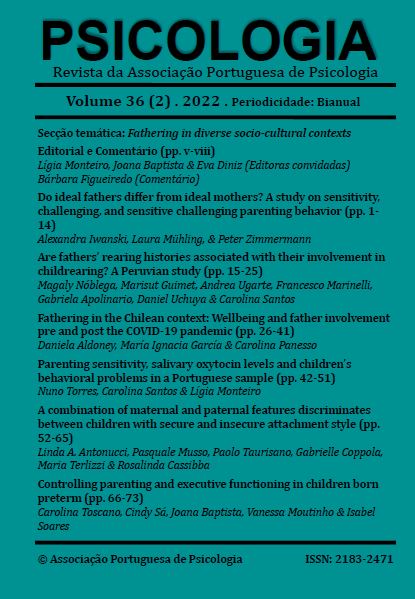Rare disease associations in Portugal: an importante source of psychosocial support
DOI:
https://doi.org/10.17575/psicologia.1803Keywords:
patients’ associations, rare diseases, advocacy, PortugalAbstract
This study aimed to characterize the development of Portuguese patient associations, mostly on rare diseases, as a relevant source of psychosocial support for patients and their families. Participants represented 23 patients’ associations or delegations, with which interviews were carried out. Recordings were transcribed and analyzed using the thematic analysis method.
Three conceptual categories emerged in the discourse: (1) mission of the associations; (2) current context of associative work in our country; and (3) strategies and opportunities for patient associations in Portugal. The most common limitations were: its voluntary character, low literacy and poor involvement of the population and professionals and lack of funding.
Results showed that associations play a key role in patient advocacy and that it is possible to reinforce their work of articulation with existing resources, facilitating the necessary integration in healthcare services and maximizing their visibility.
Downloads
References
Allsop, J., Jones, K., & Baggott, R. (2004). Health consumer groups in the UK: a new social movement?. Sociology of Healty & Illness, 26 (6), 737-756. https://doi.org/10.1111/j.0141-9889.2004.00416.x
Barbosa, R. L. (2014). Pele de cordeiro?: Associativismo e mercado na produção de cuidado para as doenças raras. Tese de mestrado, Coimbra, Faculdade de Economia da Universidade de Coimbra.
Barbosa, R. L., & Portugal, S. (2018). O Associativismo faz bem à saúde? O caso das doenças raras. Revista Ciência & Saúde Coletiva, 23 (2), 417-430. https://doi.org/10.1590/1413-81232018232.24032017
Braun, V., & Clarke, V. (2006). Using thematic analysis in psychology. Qualitative Research in Psychology, 3 (2), 77-101. https://doi.org/10.1191/1478088706qp063oa
Cavalheiro, E. (2009). The sickness or the sick person?. Revista Brasileira de Saúde Materno Infantil, 9(2), 117-119. https://doi.org/10.1590/S1519-38292009000200001
Coelho, S. (2008). Participação social e associativismo em Portugal: Breves apontamentos de um estudo de caso de uma associação de promoção do Comércio Justo. Porto, Instituto de Sociologia, Faculdade de Letras, Universidade do Porto.
Dgs.pt [homepage na Internet]. Lisboa: Estratégia integrada para as doenças raras 2015/2020 [consultado 2018 Set 3]. Disponível em: https://www.dgs.pt/qualidade-e-seguranca/estrategia-integrada-para-as-doencas-raras/paginas-de-sistema/saude-de-a-a-z/doencas-raras.aspx.
Dre.pt [homepage na Internet]. Lisboa: Despacho n.º 1222-A/2018 [consultado 2018 Set 3]. Disponível em: https://dre.pt/home/dre/114626954/details/maximized?serie=II&parte_filter=31&dreId=114626950.
Epstein, S. (2008). Patient groups and health movements. In Hackett E, Amsterdamska O, Lynch M, Wajcman J (Eds.), The handbook of science and technology studies, MIT Press, 499-539.
Faurisson, F. (2000). Problemática das doenças raras, Paris, Eurordis.
Gatportugal.org [homepage na Internet]. Lisboa: Carta para a participação pública em saúde [consultado 2018 Set 3]. Disponível em: https://www.gatportugal.org/public/uploads/projetos/MAIS_Participacao/Carta_para_a_Participacao_Pub3lica_em_Saude.pdf.
Gohn, M. D. G. (2008). O protagonismo da sociedade civil: movimentos sociais, ONGs e redes solidárias. In O protagonismo da sociedade civil: movimentos sociais, ONGs e redes solidárias (pp. 120-120).
Griggs, R. C., Batshaw, M., Dunkle, M., Gopal-Srivastava, R., Kaye, E., Krischer, J., Nguyen, T., Paulus, K., & Merkel, P. A. (2009). Clinical research for rare disease: Opportunities, challenges, and solutions. Molecular Genetics and Metabolism, 96(1), 20-26. https://doi.org/10.1016/j.ymgme.2008.10.003
Gubrium, J., & F., Holstein, J. A. (2001). Handbook of interview research: Context & method. Thoudand Oaks, Sage Publications. https://doi.org/10.1002/hrdq.1164
Harari, S. (2016). Why we should care about ultra-rare disease. European Respiratory Review, 25(140), 101-103. https://doi.org/10.1183/16000617.0017-2016
McLeod, J. (2001). Qualitative research in counselling and psychotherapy. London, Sage.
Orpha.net [homepage na Internet]. Paris: O portal para as doenças raras e os medicamentos órfãos [consultado 2018 Set 4]. Disponível em: https://www.orpha.net/consor/cgi-bin/index.php.
Pais, S. C., & Menezes, I. (2010). A experiência de vida de crianças e jovens com doença crónica e suas famílias: O papel das associações de apoio no seu empoderamento. Educação, Sociedade & Culturas, 30, 131-144.
Portugal, S. (2000). Retórica e acção educativa na área das políticas de família desde 1974. Revista Crítica de Ciências Sociais, 56, 81-98.
Rabeharisoa, V. (2008). Experience, knowledge and empowement: The increasing role of patient organizations in staging, weighting and circulatin experience and knowledge. In Akrick M, Nunes J, Paterson F, Rabeharisoa V (Eds.), The dynamics of patient organizations in Europe. Paris, Sociales, Collection Sciences, 13-34. https://doi.org/10.4000/books.pressesmines.1577
Rappaport, J. (1981). Praise of paradox: A social policy of empowerment over prevention. American Journal of Community Psychology, 9 (1), 1-25. https://doi.org/10.1007/bf00896357
Richter, T., Nestler-Parr, S., Babela, R., Khan, Z. M., Tesoro, T., Molsen, E., & Hughes, D. A. (2015). Rare disease terminology and definitions—A systematic global review: Report of the ISPOR Rare Disease Special Interest Group. Value in Health, 18(6), 906-914. https://doi.org/10.1016/j.jval.2015.05.008
Shaw, S., & McCabe, P. C. (2007). Hospital to school transition for children with chronic illness: Meeting the new challenges of an evolving health care system. Psychology in the School, 45, 74-87. https://doi.org/10.1002/pits.20280
Stainton, T. (2005). Empowerment and the architecture of rights based social policy. Journal of Intellectual Disabilities, 9 (4), 289-298. https://doi.org/10.1177/1744629505059266
Telford, K., Kralik, D., & Kock, T. (2006). Acceptance and denial: Implications for people adapting to chronic illness: Literature review. Journal of Advanced Nursing, 55 (4), 457-464. https://doi.org/10.1111/j.1365-2648.2006.03942.x
Torpe, L. (2003). Democracy and associations in Denmark: Changing relationships between individuals and associations?. Nonprofit and Voluntary Sector Quarterly, 32 (3), 329-343. https://doi.org/10.1177/0899764003254594
Tovar, I. (2014). Infarmed estuda consumo de medicamentos órfãos em Portugal. Direção de Informação e Planeamento Estratégico do Infarmed. Disponível em: https://www.infarmed.pt/documents/15786/2219894/Medicamentos+Orf%C3%A3os+2007+-+2014/8dc88b7d-8c6f-4931-b563-49989e2ba1b9
Van Groenendael, S., Giacovazzi, L., Davison, F., Holtkemper, O., Huang, Z., Wang, Q., Parkinson, K., Barrett, T., & Geberhiwot, T. (2015). High quality, patient centred and coordinated care for Alstrom syndrome: a model of care for an ultra-rare disease. Orphanet Journal of Rare Diseases, 10(1). https://doi.org/10.1186/s13023-015-0366-y
Viegas, J. M. L. (2004). Implicações democráticas das associações voluntárias: O caso português numa perspectiva comparativa europeia. Sociologia, Problemas e Práticas, 46, 33-50.


